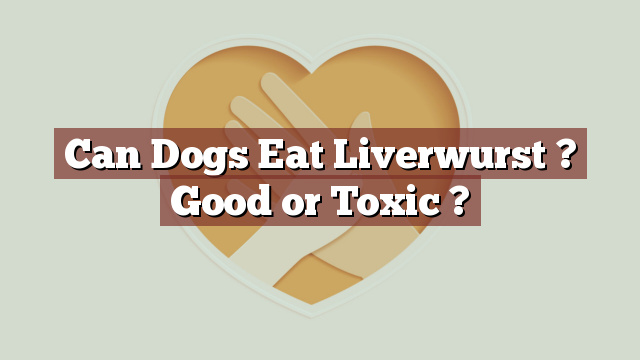Can Dogs Eat Liverwurst? Good or Toxic?
Knowing what foods are safe for our furry friends is essential for their overall health and well-being. One food that often raises questions among dog owners is liverwurst. In this article, we will delve into the nutritional value of liverwurst and explore whether it is a safe option for dogs to consume.
Nutritional Value of Liverwurst: Rich in Protein, Vitamins, and Minerals
Liverwurst is a type of sausage made from liver meat, usually from pigs or cows. It is highly regarded for its rich flavor and creamy texture. From a nutritional standpoint, liverwurst is packed with beneficial components for both humans and animals.
Liverwurst is a great source of protein, which is crucial for the growth and maintenance of healthy muscles. It also contains various vitamins, such as vitamin A, vitamin B12, and vitamin D, which play vital roles in maintaining a strong immune system, promoting healthy vision, and aiding in calcium absorption. Additionally, liverwurst is rich in essential minerals like iron, zinc, and selenium, which are necessary for optimal body function.
Safety of Liverwurst for Dogs: Moderation is Key, Avoid Excesses
While liverwurst can provide nutritional benefits, it is important to approach feeding it to dogs with caution. Can dogs eat liverwurst? Yes, but moderation is key. The high-fat content in liverwurst can lead to weight gain and digestive issues if consumed excessively.
Furthermore, certain seasonings or additives used in liverwurst, such as onions or garlic, can be harmful to dogs. These ingredients can potentially cause anemia or damage red blood cells in canines. It is crucial to ensure that the liverwurst given to dogs does not contain any harmful additives and is prepared in a plain and simple manner.
Potential Risks and Benefits of Liverwurst: Weighing the Pros and Cons
Liverwurst can offer some health benefits to dogs when fed in small amounts. The protein content can aid in muscle development and repair. The vitamins and minerals found in liverwurst can contribute to a strong immune system and overall well-being.
However, it is important to consider the potential risks associated with feeding liverwurst to dogs. As mentioned earlier, the high-fat content in liverwurst can lead to obesity and digestive issues. Additionally, the presence of harmful additives or seasonings can pose a risk to a dog’s health if consumed in excess.
If Your Dog Eats Liverwurst: Monitor for Digestive Issues, Adjust Diet
If your dog consumes liverwurst, it is important to monitor their wellbeing for any signs of digestive issues. Some dogs may experience diarrhea, vomiting, or excessive gas after consuming fatty foods like liverwurst. If these symptoms occur, it is advisable to discontinue feeding liverwurst and adjust their diet accordingly.
In case of any concerns or persistent digestive problems, it is always best to consult with a veterinarian. They can provide further guidance and advice based on your dog’s specific needs and health conditions.
Conclusion: Liverwurst Can Be Occasionally Given in Small Amounts
In conclusion, dogs can eat liverwurst, but it should be given in moderation and without harmful additives or seasonings. Liverwurst can offer nutritional benefits to dogs, thanks to its protein, vitamin, and mineral content. However, the high-fat content calls for careful portion control and consideration of a dog’s overall diet.
As responsible pet owners, it is crucial to prioritize the well-being of our furry companions. Being knowledgeable about the foods they can safely consume enables us to make informed decisions and provide them with a balanced and healthy diet.
Thank you for investing your time in exploring [page_title] on Can-Eat.org. Our goal is to provide readers like you with thorough and reliable information about various dietary topics. Each article, including [page_title], stems from diligent research and a passion for understanding the nuances of our food choices. We believe that knowledge is a vital step towards making informed and healthy decisions. However, while "[page_title]" sheds light on its specific topic, it's crucial to remember that everyone's body reacts differently to foods and dietary changes. What might be beneficial for one person could have different effects on another. Before you consider integrating suggestions or insights from "[page_title]" into your diet, it's always wise to consult with a nutritionist or healthcare professional. Their specialized knowledge ensures that you're making choices best suited to your individual health needs. As you navigate [page_title], be mindful of potential allergies, intolerances, or unique dietary requirements you may have. No singular article can capture the vast diversity of human health, and individualized guidance is invaluable. The content provided in [page_title] serves as a general guide. It is not, by any means, a substitute for personalized medical or nutritional advice. Your health should always be the top priority, and professional guidance is the best path forward. In your journey towards a balanced and nutritious lifestyle, we hope that [page_title] serves as a helpful stepping stone. Remember, informed decisions lead to healthier outcomes. Thank you for trusting Can-Eat.org. Continue exploring, learning, and prioritizing your health. Cheers to a well-informed and healthier future!

